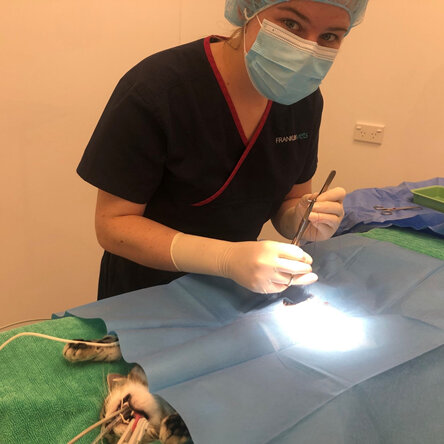Dogs
For dogs, there is no one-size fits all answer to this question. There has been research into the effects of the age of neutering of dogs that has looked for a possible link between early neutering (less than 6 months of age) and cancers, certain orthopaedic conditions, and urinary incontinence.
Some research looks at only single breeds of dogs so cannot be applied across dogs. No studies that we are aware of looked at cross-breed dogs. Many breeds, regardless of size show no ill effects from early neutering.
To date, there is no research to look specifically at the dogs in New Zealand with respect the right age to neuter. We need to be careful not to assume that conclusions reached overseas can be directly applied to New Zealand, but we can use them to help guide us in decision-making.
What we do know:
- The benefits of neutering (in addition to unwanted pregnancies, population control):
- For female dogs, it prevents a life-threatening condition called pyometra (infection of the uterus). The risk of unspayed dogs developing pyometra increases with age, with some breeds more predisposed than others. Treatment requires major surgery and hospitalization and significant expense.
- For female dogs there is also a significant reduction in the risk of developing mammary cancer. This cancer rates a special mention as the age of neutering has a big impact on its occurrence. We know that spaying female dogs prior to their first season reduces the risk of mammary cancer to near zero. Spaying after 1 season there is a slightly increased risk, spaying after more than 1 season there is little benefit. Again there is debate about this in the veterinary world but the high incidence of this condition in countries where spaying is less common strongly supports this argument.
- In male dogs, conditions such as perineal hernia and prostate enlargement are prevented and inter-dog aggression can be reduced by neutering.
The risks:
- A possible increased risk to cancers has been shown with early neutering in some research. These studies looked specifically at pure breed dogs, were not conclusive, with many showing no increase in risk at all. It is very hard to draw definite conclusions regarding early neutering and increased cancer risk for every dog especially when the cancers are either rare or the breed is predisposed to a particular cancer desexed or not. This risk should be discussed with our vets who will be able to advise you what concerns there may be with respect to your dog.
- Orthopaedic conditions: There is a concern that early neutering may delay the closure of growth plates in bones and change the bone structure making certain orthopaedic conditions more likely in large breed dogs – particularly cruciate ligament injuries and hip problems. This research again is not fully conclusive as only certain breeds have been looked at, but has influenced our advice when making decisions regarding the optimum age of neutering of large dogs. Again our vets are able to help advise what is best for your dog.
- Urinary incontinence: This can affect 5-20% of spayed dogs months to years after spaying. There may be an increase in this condition in dogs spayed at less than 3 months of age and some breeds are more likely to develop it. But it can be treated and keeping your dog from becoming overweight is also very important in preventing this condition.
- Obesity: We all know that neutered dogs are more prone to weight gain, but we have all seen plenty of chunky unneutered dogs! Obesity can also increase the risk of orthopaedic problems. The key here is to manage your dog’s diet carefully once they have been fixed.
So, we say, if you are not going to breed from your pet get it desexed:
- For small and medium-sized dogs, male or female – 5 – 6 months of age
- Most large breed female dogs – 5- 6 months or before their first heat but this should be discussed with your vet, taking into account breed, size and personal circumstances.
- Large breed male dogs – waiting until 12 months of age is most probably best but again a discussion with one of our vets is important in making this decision, taking into account your dog’s behaviour, size and breed.
Dr Phil Macleod BVSc MANZCVS (Small Animal Medicine)

